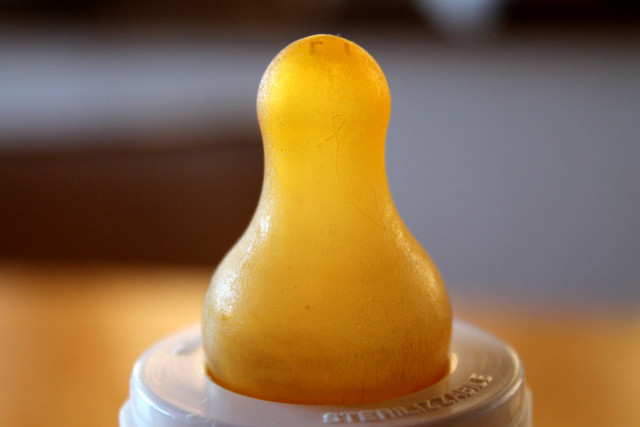Bottle-feeding might turn your baby into a sitting duck for a number of diseases, say doctors
Experts discuss childhood illnesses at seminar organised by the Health Awareness Society.

Bottle-feeding might turn your baby into a sitting duck for a number of diseases, say doctors
At a session on childhood diseases organised on Thursday at the Sheraton Hotel by the public service unit of the Health Awareness Society, doctors banished misconceptions about rotavirus and told the audience how it could be prevented. The virus causes 125 million bouts of diarrhoea in children under five globally – around 85 per cent of the cases occur in developing countries like Pakistan. It kills between five and 10 million children on the planet each year.
The virus damages the intestines and prevents the absorption of essential nutrients and water, leading to dehydration and ultimately, death. Symptoms include vomiting and frequent, loose motions followed by fever. A child might die within a week if the virus is not treated. Children under the age of two can contract the virus several times until their immune system becomes powerful enough to fend it off. Bottle-feeding and poor hygiene were deemed as the main factors behind rotavirus as well as a whole host of other diseases.
Prof. MA Arif, who is associated with the National Institute of Child Health and Aga Khan University Hospital, said that diarrhea is the most common cause of child mortality in Pakistan – a trend found across the globe.
He recalled that back when oral rehydration sachets – popularly known as ORS – were not available in Pakistan, children would be strewn all over the floor of Civil hospital, waiting for some relief against a potentially fatal bout of diarrhoea.
“The disease claimed four lives each day.” He said that though a vaccine is now available to help decimate the incidence of the virus and reduce its severity anywhere between 65 and 80 per cent, even middle-income families are opting not inoculate their children.
Prof. Arif also pointed that children are less likely to fall sick in areas of the city that are relatively cleaner. “There are fewer complaints of diarrhea in Defence and Clifton as compared to Machhar Colony,” he said.
Battling ear infections
While cotton buds are often thought of as hygiene-boosting tools, using them improperly can lead to more harm than good. Dr Salman Matiullah, an associate professor at Dow International Medical College, said that an increasing number of children are being brought to him for the treatment of Acute Otitis Media, an inflammation in the middle ear. Most cases have been caused by the excessively rigorous use of cotton buds.
He said that the disease is the most common bacterial infection in children below five. The most common symptom is high-grade fever. Irritability, crying inconsolably and tugging at the ear are tell-tale signs that a baby has been infected. In such cases, the parents should have their children diagnosed.
The disease can be bacterial or viral bottle-feeding, allergy, a parental history of otitis media and prenatal smoking make babies more likely to catch it. It is also common in children with other medical conditions such as Down’s syndrome.
Dr Matiullah said that mothers should avoid cleaning their babies’ ears with cotton buds or putting oil in them. “Children, like adults, have a natural lining that prevents any dirt and even insects from entering the ear cavity.”
The infection can be treated by inserting a ventilation tube in the ear. Earlier, many people could not afford to treat their children as the tubes used to cost up to Rs2,000. But now, they can be imported from India for nearly one-tenth that price. However, more severe forms of the disease necessitates surgery.
Dr Matiullah said that prevention is more cost-effective than treatment. The flu vaccine as well as Xylitol, a sugar substitute found in chewing gums, can prevent it.
Published in The Express Tribune, September 1st, 2012.



















COMMENTS
Comments are moderated and generally will be posted if they are on-topic and not abusive.
For more information, please see our Comments FAQ